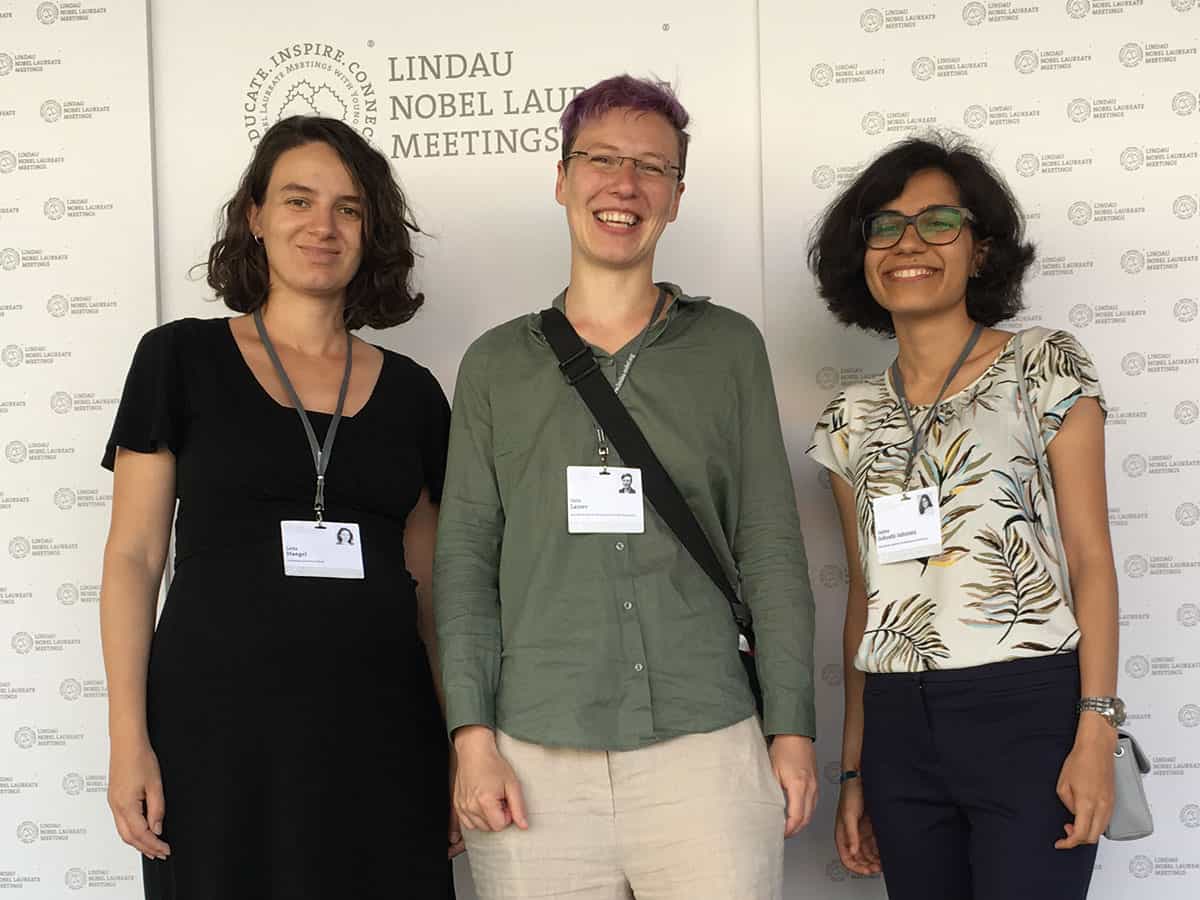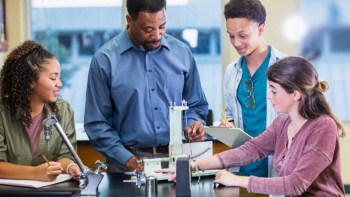Jude Dineley catches up with three early-career scientists whose work outside the lab is helping improve the academic environment for others

If you’re aspiring to a life-long career in science, it can often feel like there aren’t enough hours in the week. Finding time to look beyond your own research, however, can be rewarding. At the 69th Lindau Nobel Laureate meeting in Germany this July, I spoke to three early-career scientists active in projects to make academia healthier, more productive and equitable, while picking up valuable experience along the way. Here are their experiences.
Tackling toxic work environments
Originally from Austria, Jana Lasser was a postdoc at the Max Planck Institute for Dynamics and Self-Organisation in Göttingen, Germany, until the end of November this year. In the spring, she finished her PhD investigating the formation of curious geometric patterns on the surface of salt flats such as the Badwater Basin in California. Beyond the lab, last year she served as the elected spokesperson of the Max Planck PhDnet, a network of about 5000 PhD candidates, making her acutely aware of the challenges that early-career researchers face.
With hours approaching that of a full-time job, Lasser’s spokesperson role was tough to balance with her PhD, but well worth it. “It was the best thing I did in my life so far,” she says, adding that it was “like a crash course in everything – leadership, communication, negotiation, conflict management, time management and project management”.
There is mounting evidence that large numbers of young scientists suffer from stress and mental illness
Mental health was a hot topic during Lasser’s term. There is mounting evidence that large numbers of young scientists suffer from stress and mental illness and, typically, problems at work play a significant role. Consequently, when the PhDnet became involved in a Max Planck task force on employee health, Lasser and her colleagues pushed to increase the focus on mental wellbeing. A direct outcome was a 24-hour mental-health crisis hotline for all staff, which launched in April. It has sparked plenty of interest. “Many people asked me, ‘Is it already there? We want it. We need it’,” she says.
Though valuable, Lasser describes the hotline as, ultimately, a “really good band-aid”, naming the publish-or-perish mentality and job insecurity as critical underlying factors. “If you know that you’re probably going to move every second year, then it’s hard to build a network, it’s hard to have a life outside of work…relationships are destroyed,” she says. “I’ve seen that in my circle quite a number of times.”
Supervisor behaviour, too, can have a decisive impact on young researchers, with bullying at one extreme. In 2018 allegations of bullying involving senior researchers at two Max Planck institutes hit the mainstream media. After assisting in the immediate aftermath, Lasser became part of a second task force addressing the issue at a systemic level. She spoke to hundreds of doctoral researchers, many of them victims, about their experiences, informing a white paper she wrote with her colleagues. Among a long list of recommendations were robust institutional frameworks for handling disputes promptly and mandatory management training for PIs. “When you become a group leader or professor, you are not necessarily educated to be a good manager” says Lasser. “We have to recognize that and train these people.”
Breaking down barriers
Also based in Göttingen, Salma Sohrabi-Jahromi is a PhD candidate at the Max Planck Institute for Biophysical Chemistry. Barriers – and breaking them down – is a theme that has popped up repeatedly in her career. She is a computational biologist, who switched from biotechnology. A true interdisciplinarian, her research sits at the boundary between biology and physics, investigating the behaviour of biomolecular condensates and their physical properties in cells.
Political barriers – albeit indirectly – inspired Sohrabi-Jahromi to become active in the academic community as an undergraduate. Studying in Tehran in her home country Iran, she experienced the isolation of the local science community caused by political sanctions. Then, the city was chosen to host a rare international meeting in her field. She jumped at the chance to help organize it and network with visiting scientists. “It was really rewarding,” she recalls. Guests included a researcher from her current institute and, through them, she learned about the Max Planck international graduate programme, which she eventually ended up joining.
In Germany, outside of her research, Sohrabi-Jahromi has helped tailor computer-science and statistics teaching in her institute, to better engage graduate biologists. Spurred on by her earlier experience in Tehran, she has also helped organize events for early-career researchers, from seminars on careers and mental health for new PhDs, to interdisciplinary gatherings. “I’m particularly interested in bridging between different fields in science and somehow bringing people from different backgrounds together,” she says. One such event Sohrabi-Jahromi helps organize is Horizons, a local conference that brings scientists together from across the life sciences. There, she’s found it particularly gratifying to see collaborations sprout at the event, some of them lasting several years.
When two fields collide, the rewards can be large. “In biology, a lot of amazing discoveries that have happened are by physicists,” she says, citing research by biophysicist and Nobel laureate Joachim Frank as a favourite example. He continues to advance cryogenic electron microscopy – an imaging technique he pioneered last century – to observe cell dynamics, facilitating research in molecular medicine.
Like Lasser, Sohrabi-Jahromi has no regrets about getting active in the scientific community. “It has helped me, really a lot, not only in meeting really amazing people and networking with them, but also to develop myself personally,” she says. “[I’ve learned] how to form groups and communicate with people and how to lead when things are not moving on.”
Empowering young scientists in Africa
Based at the University of the Balearic Islands in Palma, theoretical physicist Leïla Haegel analyses gravitational-wave data from the prestigious LIGO experiment. Outside of her research, it’s been a busy year for the French postdoc. She welcomed the arrival of her first child – a little boy – and founded ADARA, the Association for the Development of Arab Research.
Haegel’s goal is to help empower young people in Arab countries who are interested in scientific research. She established ADARA to formalize her efforts after organizing a four-week internship in her group for a high-school student from Morocco – Haegel has strong family ties in the country. The student was interested in both science and engineering, but was unsure which path to follow.
Earlier in her career, Haegel did internships at CERN and her current university. “There should be more internships, just to see how things are [in research]” she says. “It was a good experience for me.” The student’s internship was a success. She wrote her first Python code and got a taste of how astrophysicists work day-to-day – often without telescopes, as she was to discover. She is now keen to pursue a career in physics.
For Haegel, the experience highlighted how, without support, students often don’t make fully informed decisions when opting for a career in research – even more so in countries such as Morocco. “[These] problems that we experience everywhere in science are stronger in countries with less investment in research.”
Through ADARA, Haegel plans to expand her activities beyond internships, starting in Morocco. “The idea is to reach more Moroccan students and researchers by providing [scientific] seminars there, as this is a country where little money is available to invite researchers.” ADARA’s first events begin this month in universities in Casablanca and Rabat. She is also planning round table events on careers and specific issues, such as grant applications, featuring local and international researchers.
While paying forward her privilege motivates Haegel, she also sees ADARA as one small step towards a more inclusive – and ultimately more productive – community that she would like to work in. “I am not interested in science being an elitist club but in spreading it as much as possible.”
More broadly, there are other aspects of academic culture that need be addressed, she says – including the pressure to publish, systemic biases against researchers who are carers, and financial barriers and visa difficulties that prevent non-Western researchers from attending conferences. Early-career scientists should play a part in driving change, she believes. “We don’t have to accept those drawbacks, and as young scientists, I feel that it is also our responsibility to solve these issues, so we can do better science as a non-elitist community.”


